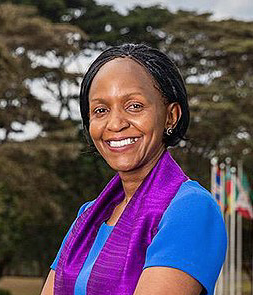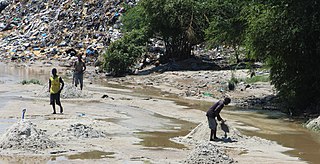
The University of Dar es Salaam (UDSM) is a public university located in Ubungo District, Dar es Salaam Region, Tanzania. It was established in 1961 as an affiliate college of the University of London. The university became an affiliate of the University of East Africa (UEA) in 1963, shortly after Tanzania gained its independence from the United Kingdom. In 1970, UEA split into three independent universities: Makerere University in Uganda, the University of Nairobi in Kenya, and the University of Dar es Salaam in Tanzania.

Dar es Salaam Region is one of Tanzania's 31 administrative regions and is located in the east coast of the country. The region covers an area of 1,393 km2 (538 sq mi). The region is comparable in size to the combined land and water areas of the nation state of Mauritius. Dar es Salaam Region is bordered to the east by Indian Ocean and it is entirely surrounded by Pwani Region. The Pwani districts that border Dar es Salaam region are Bagamoyo District to the north, Kibaha Urban District to the west, Kisarawe District to the south west and Mkuranga District to the south of the region. The region's seat (capital) is located inside the ward of Ilala. The region is named after the city of Dar es Salaam itself. The region is home to Tanzania's major finance, administration and industries, thus the making it the country's richest region. The region also has the second highest Human Development Index in the country after Mjini Magharibi. According to the 2022 census, the region has a total population of 5,383,728. The region has the highest population in Tanzania followed by Mwanza Region.

Following Tanganyika's independence (1961) and unification with Zanzibar (1964), leading to the formation of the state of Tanzania, President Julius Nyerere emphasised a need to construct a national identity for the citizens of the new country. To achieve this, Nyerere provided what has been regarded by some commentators as one of the most successful cases of ethnic repression and identity transformation in Africa.
The Anglican Church of Tanzania is a province of the Anglican Communion based in Dodoma. It consists of 28 dioceses headed by their respective bishops. It seceded from the Province of East Africa in 1970, which it shared with Kenya. The current primate and archbishop is Maimbo Mndolwa, enthroned on 20 May 2018.

Sven Erik Jørgensen was an ecologist and chemist from Denmark.

Water supply and sanitation in Tanzania is characterised by: decreasing access to at least basic water sources in the 2000s, steady access to some form of sanitation, intermittent water supply and generally low quality of service. Many utilities are barely able to cover their operation and maintenance costs through revenues due to low tariffs and poor efficiency. There are significant regional differences and the best performing utilities are Arusha and Tanga.
The Bishop of Zanzibar is the Diocesan of an island diocese in the Anglican Church of Tanzania. Its current bishop is Michael Hafidh. The bishop's seat is Christ Church, Zanzibar, the Anglican cathedral in Stone Town, Zanzibar, Tanzania.

The People's Bank of Zanzibar (PBZ) is a commercial bank in Tanzania. It is licensed by the Bank of Tanzania, the central bank and national banking regulator.
Letshego Bank Tanzania Limited, commonly known as Letshego Bank is a commercial bank in Tanzania, licensed by Bank of Tanzania, the central bank and national banking regulator.
Tanzania, officially known as the United Republic of Tanzania, is a mid-sized country in southeastern Africa bordering the Indian Ocean. It is home to a population of about 43.1 million people. Since gaining its independence from the United Kingdom in 1961, Tanzania has been continuously developing in terms of its economy and modern industry. However, the country’s economic success has been limited. Environmental obstacles, such as the mismanagement of natural resources and industrial waste, have been contributing factors and results of the relatively low economic status of the country. Tanzania’s annual output still falls below the average world GDP. In 2010, the GDP for Tanzania was US $23.3 billion and the GDP per capita was US $1,515. Comparatively, the GDP for the United States was $15.1 trillion and the GDP per capita was approximately $47,153. Eighty percent of the workers accounting for this annual output in Tanzania work in agriculture, while the remaining 20% work in industry, commerce, and government organizations. Such a heavy reliance on agriculture has placed a huge amount of strain on an already limited supply of viable land.
The Dar es Salaam University College of Education (DUCE) is a constituent college of the University of Dar es Salaam in Tanzania. DUCE is located in Miburani ward, Temeke municipality close to Tanzania National Stadium. It is one of the higher learning institutions in Tanzania established in 2005 as part of the Tanzanian Government development policy to extend secondary school education in Tanzania. The core activities of the college is teaching, conducting research and offering public consultation.
Khalila Kellz Mbowe is a Tanzanian creative performance director and social entrepreneur, who is the founder, managing director and chief executive officer of Unleashed Africa Social Ventures, an enterprise that trains gifted young people in the performing arts, offering education, mentoring, exposure and opportunities to succeed in life.
Mary Mgonja, is a Tanzanian agricultural scientist and plant breeder, who works as the director for technology and communication at Namburi Agricultural Company Limited, a private Tanzanian agricultural enterprise.

Joyce Msuya is a Tanzanian microbiologist and environmental scientist who has been serving as Assistant Secretary-General for Humanitarian Affairs and Deputy Emergency Relief Coordinator in the United Nations Office for the Coordination of Humanitarian Affairs since 2021. From 2018 to 2021, she served as the Deputy Executive Director of the United Nations Environment Programme (UNEP) at the level of Assistant Secretary-General.

Tolly Salvatory Augustine Mbwette was a Tanzanian academic, engineer and educator. He held various positions in national and international institutions of higher learning over his lifetime, including that of vice chancellor of the Open University of Tanzania. He was a team leader for various multi-disciplinary research teams responsible for both drinking and wastewater treatment systems that rely on bio-systems.
Rosemary Nyerere was a Tanzanian politician and academic. She was a daughter of the late Mwalimu Julius Nyerere, the founder and first president of the United Republic of Tanzania.
Hashil Twaibu Abdallah is a Tanzanian academic Lecturer of Law and currently Permanent Secretary of Trade and Industry in Tanzania. He was a deputy Permanent Secretary of Trade and Industry appointed by President Samia Suluhu Hassan on April 6, 2021. He was the Deputy Dean in the Faculty of Law and Head of Department of Criminal Law at the Open University of Tanzania for more than ten years.

Msimbazi River is located in Dar es Salaam Region of Tanzania. It begins in Kisarawe ward, Kisarawe District and eventually drains into Zanzibar Channel at the border of Upanga West ward of Ilala MC and Hananasif ward of Kinondoni MC. The length of the Msimbazi River is about 35 kilometers. It flows eastward into the Zanzibar Channel of the Indian Ocean via the Pugu and Kazimzumbwi Forest Reserves, joining the Sinza, Ubungo, and Luhanga Rivers along the way.
Josephine Lemoyan is a Tanzanian sociologist, social services analyst, and politician. She is a member of the Maasai people. After completing degrees in social sciences at the University of Dar es Salaam in Tanzania, and the University of Hull, in England, she specialised in WASH systems from the early 1990s. Working with governments and NGOs, she advised on wastewater treatment facilities and water and soil conservation. In 2017, she was elected as one of the Tanzanian Members of Parliament for the East African Legislative Assembly (EALA). She served on the EALA's Commission, which oversees the body's administrative functions and served on the committee to evaluate projects and facilities that support the East African Community's common market and custom's union integration. As a member of the Committee on Regional Affairs and Conflict Resolution, she worked on legislation to integrate regional laws on livestock movement, trade, and to protect the ecosystems and safe and secure movement of people and goods on Lakes Tanganyika and Victoria.







